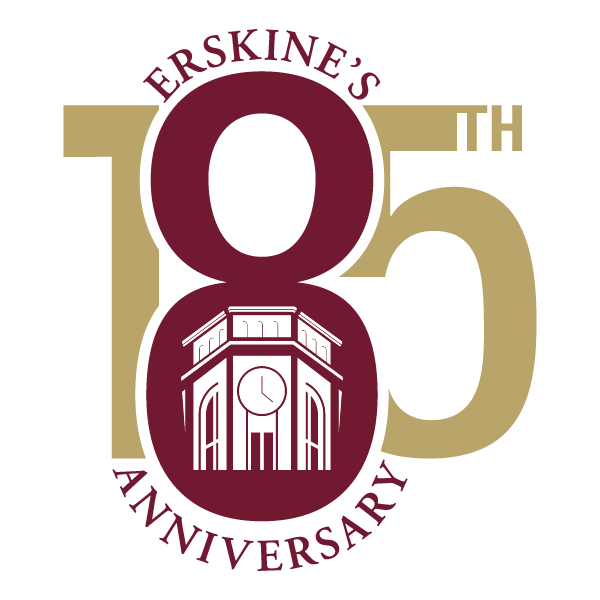On Mission for over 185 Years
November 2024 marked Erskine’s 185th anniversary as a four-year college. In celebration of this milestone, Erskine developed an online archive dedicated to preserving and sharing the history of the school and its community. Click the button to access our growing archive, or read a brief history of the college below.

The Early Years
Erskine College was founded by the Associate Reformed Presbyterian (ARP) Church in 1839. Prior to this time the church had established an academy for men in Due West, S.C., in 1835, and a seminary in 1837. The academy became Erskine College, the first four-year church-related college in South Carolina.
By the time of the Civil War, Erskine had become one of the thriving colleges of the region with more than 100 students enrolled. Following the war, loyal supporters rebuilt the endowment wiped out by the conflict. They also financed construction of the Erskine Building and established Chairs in Chemistry and English Literature under widely respected professors. These professors helped Erskine establish a reputation for academic excellence as the college moved from the classical to the liberal arts curriculum.
Also enhancing this reputation were the Erskine literary societies, as old as the college, which trained championship debaters and supplemented speech and literary training. The large auditorium constructed in 1892 brought renowned speakers to Erskine and continued Erskine’s role as a cultural and educational center of the South Carolina Piedmont.
Into the 20th Century
Erskine played a significant role in the education of women. The Due West Female College (later Woman’s College of Due West) was founded independently by ARP ministers and laymen in 1859 and came under the oversight of the ARP Church in 1904. Erskine College first began admitting transfer students from the Woman’s College in 1894 and became officially coeducational in 1899.
A planned merger of the college, the seminary, and the Due West Woman’s College paved the way for accreditation by the Southern Association of Colleges in 1925. By 1927 the three schools had merged into one institution called Erskine College, with the seminary serving as its graduate theological school.
During World War II Erskine served as a cadet training school for the United States Army Air Corps. A substantial enrollment effort in the late 1950s brought Erskine’s undergraduate enrollment to over 700 students throughout the 1960s and into the 1970s.
Expansion and Growth
Erskine Theological Seminary began offering courses at off-campus locations in the 1980s as well as arranging class schedules to accommodate commuting students. Since that time, students from many backgrounds — Presbyterian, Baptist, AME, Methodist, Pentecostal, and non-denominational — have joined students from the ARP Church to receive training for ministry. The Seminary launched its distance education program (now Erskine Online) in the 1990s. In 2010 the Columbia campus was approved to offer complete degree programs.
In Fall 2022, Erskine’s student population topped 1,000 for the first time in the institution’s history. Erskine celebrated 185 years as an institution in 2024.
Athletics at Erskine
The Erskine Flying Fleet competes on the intercollegiate level as a member of the NCAA Division II (Conference Carolinas). This name “Flying Fleet” was adopted after Greenville News sportswriter Carter “Scoop” Latimer commented on Erskine’s passing strategy in a 1929 football game. Football was dropped 1952 but was reinstated in 2019. In 2021, The Flying Fleet played its first football game in 70 years.
A Promising Future
Erskine College has become known for providing excellent preparation for graduate and medical school, and for equipping students to lead in their professions and communities.
Erskine continues to grow and thrive in today’s atmosphere of accelerating change. Affirming the Christian faith on which Erskine was founded, we remain dedicated to offering an education that will prepare students well for lives of service and leadership.
